After watching several of his independent films about a modern day Jesus appearance, I reached out to talk to this skilled actor to find out more. When he found out I lived near Austin, he immediately asked if I’d been to Robert Rodriguez’ house. I told him no, but I was relieved to discover that he still wanted to do the interview even though I didn’t know the infamous Sin City/Spy Kids director personally. Hopefully someday filmmakers will begin to associate Louisville, Kentucky, as the home of one Jefferson Moore.
For the next hour, it was a joy to learn about his history, the thought and inspiration behind his craft and his standards for film making.
What got you into acting? Please include time markers, like age, events and inspirations.
I was in my first play in high school in my senior year. Our high school was doing Grease and I got together with some other ball players and we all agreed that it would be a manly thing to do because we would get girls. So, we all locked arms. Girls aside, I really took to what was going on there. So, later on that year our high school did a straight Agatha Christie murder mystery. I signed on for that as well. So, that’s where I started with it. I didn’t really do a whole lot in College. I always kind of had the inclination, but I just never got back in to it. I ended up getting a job out of college. I did a little bit of modeling when I was at the University of Kentucky, but nothing along the acting lines. When I was engaged to my wife, around 1988, we had just got engaged and she was going to an audition for a regional theatre down around Nashville and I was just her ride there and I was in the waiting area and the director comes out and says that the person who was supposed to read with some of the actors had not shown would I mind filling in until he got there. Well, I filled in and just took the script and kinda knew what to do with it and the guy ended up never showing but I also ended up getting cast in the show. So, that went really well.
I was working in sales then so I could kind of set a few of my own hours. So, I stayed on with that regional company there, it was actually in Western Kentucky. I stayed with them for about five years and did about a dozen productions with them. So that’s where I did a lot of theatre and did more regional theatre around the state closer to Nashville. Someone in the company suggested … around 1991, Kelly and I were married at that time and I still had a full time job … someone suggested that I get some head shots and go down to Nashville and see because I had a good chance at getting some commercial work. So, I had some really bad headshots made and started going down for some auditions mainly for commercial and commercial acting type things, nothing dramatic. I did that for about a year or two and then I was going to a commercial for a department store down there and my agent in Nashville said, “When you get done there go on over for this music video audition,” and I said, “Well, you know I had not really thought about that and I really wanted to do this job for the department store.” And she said, “Well, go on over there anyway.” So I went over and auditioned for the music video and it turned out to be a groundbreaking music video (“Feed Jake” – Pirates of the Mississippi, 1992) at the time because it didn’t feature the band. It was all actually a music film, more like. It wound up getting heavy airplay on all of the music channels. So, I kind of got to be, had a little bit of reputation, as this guy around Nashville and that’s when country music was really booming at the time. And that was what kind of got my feet on the ground. I kept working professionally after that.
I was a working actor and I was doing a lot of commercials and I was still working at sales. I was working in and out of my job. I was working at doing commercials and I auditioned for a lot of films but I did not get cast in anything. This was all through the ’90s. I got cast for a TV pilot that was based out of Los Angeles but they were shooting on location in Alabama. It was people from Joel Silvers company. I was the only non-L.A. member in the cast. We shot in Alabama and we shot part of it out in L.A. The pilot did not get picked up, so I remained in sales. It was about another five years before I got cast in my first feature film. That is where I got my SAG (Screen Actors Guild) card and my first feature film was with Lou Diamond Phillips and Andre Braugher. I was kind of the main character. I wasn’t in the film as much as them, but I was the main character that everyone was looking for. So, I my character kind of set the tone for the story so it was a really big part for me. I got to do my own fight scenes and what not. It was my first studio picture. That was A Better Way to Die. Right after I finished that one, I had some momentum going, I got cast as one of the leads in an ABC made for TV Movie of the Week. So, that was my next job right after that. I started to pick up some independent films and doing a little more theatre work after that as well. I still had a full time job that I was working around it still, just so I could keep acting. It was funny, after the first music video, “Feed Jake,” around Nashville people would come up and talk to me and tell me how much they loved the video. I would realize after a point that they thought that I was in the band. So, we had a lot of fun with that one.
What is the difference between theatre and film as far as acting on stage in a theatre; how does that translate to film and what are the major differences?
Other than the time commitment … it’s the fact that there is no do-over. When you are on stage you are in a performance and there is no such thing as “Cut, do it again.” In theatre, you are out there. When you screw up, you’ve got to live with it, you know, for the consistency. The other part, especially for musical theatre, which I have done as well, is you’ve got to be big. There is nothing small, for logistical reasons. You know, you have to vocalize and project for the audience. So, someone in the 49th row needs to see you and see everything that you’ve got going on facialy and vocally as well as the person sitting in the 2nd row. So, you have to be just a little bit bigger than yourself, you know, even in intimate theatre. Doing work with a camera is very intimate because you work with close ups. You are working with your voice being miked, so you don’t have to project in a way that makes it unnatural. So it’s a lot more of an intimate type deal.
I hear that this year marks the 20th anniversary of your first film role – A Better Way to Die. Tell us about that film, what you learned from the experience and what highlights you recall from that film?
My mind had been blown. It was my first … I mean I had done commercials for Opryland and stuff and, you know, regional theatre plays and things, so everything was pretty scaled down. But, here I was … in my first film. I had auditioned for films for almost ten years and I was starting to think, ‘Well, it’s just not going to happen.’ I auditioned for this film and they said, “Well, this role that you are auditioning for, you know, it’s an FBI agent, so there is some fight work that goes on. Are you comfortable with that?”
I said, “Yeah.”
I did my lines a couple of times and on about my third audition a guy stepped out from behind the camera and said, “Would you mind, just kind of shuffling around a little bit with him just to see how you move?” So, the guy conducting the audition said, “He is going to grab your arm now, get out of it.” The guy was a little bit taller than I was and about the same weight and build. The guy grabbed my arm and instinctively I pulled away from it and I threw a spin kick and I meant to miss him but I caught him right on the side of the head. I said, “Well. I guess I am done. I am really sorry. I tried to pull it.” It turned out the guy I was kicking was the director and the writer and he was so impressed just by my instincts, to keep it brief, that I got the part. So, I remember that part of the audition.
But then, you know like, the first time you sit in your trailer that has your name on the door, that’s really a rush. And the day that Lou came was such a memorable day. Because when I wasn’t in the business and was still in sales in Lexington, I saw La Bamba at the theatre and just became a Lou Diamond Phillips fan right off the bat. And right after that I saw, you know, in the theatre, I saw Stand and Deliver. I saw Young Guns. I just thought this guy had it. So, the day he comes to the set, I just noticed him getting out of his car and I was just kind of looking out of the corner of my eye trying to keep my cool. He makes a bee line over to me and sticks his hand out and says, “You must be Jefferson, I’m Lou.” Just to hear those words from someone considered a hero up to that point, was such as rush. And then after that, we are doing scenes together. So, that was the memorable part of it. It’s like, okay when your hero is standing right next to you introducing himself to you, like he needs to. That was a memorable part of that. It’s hard to believe it’s been 20 years.
They say good actors act with their eyes. How do you do that and how do you get good at it?
It’s all about focus. That’s one of the things that I tell actors, especially new actors that I feel like need a little bit of coaching. I say it’s all in the eyes. You can tell a bad extra on television because their eyes are not focused on what the scene is about. I tell somebody that no matter where you are in the scene, whether you’re given the close up or your the guy’s back at the park bench, if your eyes are not focused on where your character is supposed to be, you are going to lose them. And that is something I’ve always maintained. I’ve never had any trouble with that — with distractions or anything like that. I think I’ve become so immersed in what I am doing and in the scene, that I really do leave myself. So, my eyes are focused because all of me is focused. My brain is focused. My heart is focused. You know, I am breathing with that character. That’s not a technique, that is a part of becoming instead of acting for me.
What do you think is the connection between sales and acting?
There is no connection between sales and acting.
Do you think sales helped you in any way?
No, it really didn’t. What prepared me for acting is … sales was a job and I thought that was the best I was ever going to do. I thought that was the most I was ever going to be was a good salesman who made a lot of money. And acting, I think acting for me started because I was a fat kid who didn’t have a lot of friends and preferred to stay in the house. I had skin as white as Kleenex. I didn’t have a lot of friends. I was painfully shy. So, really I think that is where my imagination was really born. I was the original, and still am, the original Walter Mitty character because I would imagine the things I would do if I was more confident or if I wasn’t overweight or if I had a lot of friends. And I think that really transpired to being able to get to character so quick. My imagination puts me there instantly, because, you know, I would imagine the adventures for myself, or whatnot, and you know, being thin and having friends were like the costumes I would wear. So. I really think that’s where it started. Sales? Sales was a job, just plain and simple — a job. I wasn’t great at it. The last job I had I was a sales rep for the Kinkos Corporation and I turned out, the last year I was there, I was the #1 salesman in the world. They said, “Well, you are going to get to speak at the conference. They are going to want you to explain your sales technique.”
I said, “Well, I don’t really have a technique.”
They said, “What do you do?”
I said, “I’m just nice to people.”
They said, “That’s how you’ve been successful?”
And I said, “Well, that and the grace of God.” I’m like, “That won’t make a good speech, will it?” They agreed and I wound up quitting before the sales conference ever came up. I heard that the second place guy put on a much better show than I would have.
I like the way your conversations with the characters in The Stranger series and in The Perfect Stranger often turn someone’s question directed at Jesus back to the person asking. How have you researched both the questions people ask of God and the answers? Where do you go for help?
Well, I don’t have a good answer. The Stranger movies were all based on novels, so that really goes to David Gregory that wrote them. I did the screenplays on those which were pretty much, you know, almost verbatim. Adaptation of the dialogue and the novels with just a few tweaks, here and there, but really, all that credit goes to him. I think that they are all pretty viable. That’s really what first drew me to those books. In doing that first screenplay, just that David had really nailed the most pertinent questions and how they went back and how they were biblical because Jesus usually answered a question with another question. So, I’ve really got to give him that credit because I really had very little input into the actual, you know, dialogue and what he chose to do. But, of course, in the novels, he went a little bit deeper on some other things as far as, you know, some theology. So, I guess we kind of pulled the most humanistic populist questions from his books.
When playing a role like Jesus, what kind of pressure or challenges does that present – especially in light of The Perfect Stranger and other shorts that feature Jesus hanging out with everyday people and answering their important questions about the existence of God and/or doubts that keep them from the faith? For example, it’s one thing for me to present a documentary where I present my ideas and my opinions and answers to some of these common and all-important questions, but it’s quite another thing to present these answers as coming directly from God Himself in a dramatic narrative.
I think I gave myself, before we did the first Perfect Stranger movie, I took part in a Broadway scale Passion play here in Louisville. I did that for five years before we did The Perfect Stranger movie. And, it was a play here in town, in Louisville, that had been in existence, I think for almost fifteen years. And I took over from a guy who had done it for about five or six years and I had seen how he did it. So, when I came on board and took over the role of Jesus, and like I said, it was a full Passion play with the lifetime, and the crucifixion is shown and the resurrection, you know, with the full flying machine — the whole nine yards. The director and I, because there was a new director, because the other director had been there for like twenty years, and so there was a new Jesus and a new director the year I took it over. And, I found myself throwing more nuances in that people really responded to. Not that I was trying to do it differently than the last guy did, but I really wanted to throw my own thing into it. Part of what I would do is when I was making dialogue with people during the big numbers and whatnot, I made sure that I would really focus on people. While they were talking and I was talking to them and this is just talking when something was going on the other side of the stage, we call it call stage talking, I would do just little nuances like looking at the person’s face and asking them and really intently listening, and you know, and picking up little kids as I walked around. And I did a lot of laughing and some of the feedback we got from the first year we did the show was “I never imagined Jesus laughing.” So, it was little things like that which people responded to that in that Passion play. About 60,000 people attended every year the performances of that show. Some people came from all over the country. Some people as far away as Russia to see the shows. It was a big scale show.
I took pretty much what I learned about what people responded to and I put that into the guy in the Armani suite in the restaurant, you know, the guy with the full costume with the long hair and the brown contacts. So, I looked like a Hebrew. But, in doing it, you know, in my own modernization with my own blonde hair and wearing an Armani suite and I was clean cut. I kept the same nuances of how intently that he listened to, you know, the person next to him as the only person in the room and how he found humor in things and down to the part where he said he did not like neckties. So, I didn’t really feel any pressure to be holy with that. I felt more pressure to be someone of authority who was likeable. So, the pressure was more of a challenge, because I did not want to be like the uncle who buys you beer and, you know, everything’s good, I’m your buddy. But, at the same time I didn’t want to be like the lightning bolt that strikes you dead, you know, if you don’t go to church on Wednesday night. So, I think it was more of a challenge than pressure to be that human and that compassionate but at the same time being the universal authority. So, I really see it that way. And, of course we did get it in some places. There was a little bit of it on drinking wine. We got a little bit of flack for that in a couple of areas. But overall, there was really nothing objectionable about it. And we did not pull any punches either, so that part we really stayed true to the script that we did not pull any punches. This Jesus character said, you know, Hinduism is wrong. It is incorrect. He said that, you know, what Islam says, he said it’s incorrect. That was just the beginning of when political correctness, when saying something like that was the most intolerant thing you could say, but it was true to the Jesus of the Bible who just made no bones about who He is. So, that part was challenging, as well. My co-director and I went back and forth asking are we going to leave this in here and we said, “Yeah, let’s stick with it.”
I’m curious what sort of challenges playing the role of Jesus brings when people recognize you on the street. I’ve got a funny story about some drawings my dad made where I was the long-haired model for Jesus…
I don’t know that when people recognize me, that they really tie the Jesus thing in. I don’t hear a whole lot of that. People do recognize me but I have not had any confrontations or anything like that. It’s always been, you know, we’ve seen you in the movies and I am usually not sure which one they are referring to. So, I have not had a whole lot where people brought that up with me. I read a lot of things in reviews and things like that where people appreciated the way that I betrayed him in a passionate way. Not so much from people who see me in the street. I’m still really that shy kid, to be honest with you. I never grew out of that. So, when people see me in places, you know, I always try to be gracious but I really don’t promote any prolonged conversations because I really feel like I have nothing really to say to anybody, you know, outside. So, I usually say, thank you, thank you for watching, I am glad you appreciate the show and whatnot. One thing we have heard in the forum of reviews and emails that we’ve got from people who watched our films, and are always happy when people watched our films, but we are really happy when we hear from people that, you know, that for one reason or another have left the church or people who that were seeking and got the wrong or did not get the answer that they wanted… and we have heard people from people that say, you know, if I had heard the gospel presented this way I never would have left the church, or I never would have fought with my mother over it if I’d had it presented to me the way you guys did. We take that as a compliment. We take great responsibility in that. So, that is why we want to make sure that we didn’t get outside, even though we were creating a fictional character of sorts, that we did not want to get outside of the Gospel and take too much dramatic license with anything because we did have a responsibility. At the end of the day, we were presenting the Gospel.
Tell me about your first documentary – National Anthem Girl. What’s it about? Where did the inspiration come from? What do you hope to accomplish with it?
I’ve always wanted to do a documentary. I love documentaries, it is one of my favorite things and has been for a long time. I was watching Fox News one morning and there was a girl talking to the host and I recognized her as this actress that I had seen in an episode of 24 and I thought she was really unique looking and I thought, ‘What is she doing on Fox News. So, I turned it up and listened to what she was doing on there. And, it turned out that it was not the actress from 24. It was just someone who looked a lot like her. So, that got me to turn the sound up to listen. And, it turned out it was this girl from Long Island that was on a journey to be the first person to sing the National Anthem in all 50 states. No one had ever done that before. And this is 2014, this is before the Colin Kaepernick controversy ever started. So, this young lady, I think she was on state 23 at the time that she was on Fox News to just kind of promote what she was doing. She had made a decision to take on this journey and she was trying to finish in time for the 200th anniversary, which was August of that year, of the National Anthem, which hardly anyone really knew at that time.
Along the way of her journey she was promoting patriotism and gratitude for our troops and doing a lot of things for the troops in each state that she went to. After seeing her that time on the news, she put a map up of all the states she had not yet visited because she did not have venues. She was doing all this self-funded and all of her own booking. I noticed that one of the states that she had not been to was Kentucky and she had put a website on there. I got her website and emailed her and said, “Hey, I noticed you haven’t been to Kentucky, we know the owners of the local Triple A team here if you need a venue. We can give you some contacts there. Also, we own a production company and we have HD cameras if you would like for us to come give you some coverage, we’d be happy to.”
So she responded and needed a venue. She said, “Yes that would be great. I have to film everything on my iphone because I am all by myself.” She came to Louisville in July, 2014 and we picked her up at the airport and we had the cameras rolling from the time that she got off the plane and the whole time she was here while she was making media appearances and whatnot. And we all really hit it off. And we wound up finishing with her giving her support like that through the end of her journey. We were in state 50 with her when she completed the last state which was down in Nashville for a Titans game. She had a great story. She was from Long Island. She sang in college. She loved singing the National Anthem. She had a real passion for it. She ended up going to L.A. to become a rock star and spend all her money on an album that went nowhere. And, she was stuck in L.A. and she was afraid to tell her family that she had bombed out. So, she even didn’t have money to move back. So, she said she spent a long time feeling sorry for herself and one day she just said, “What can I do to help somebody?”
She said, “I want to help somebody with what I have. I’ve got my voice, what can I do?” So, that’s when she made a decision. She said, “What if I can sing the National Anthem, which I already love doing? What if I can do something to promote that song and the gratitude for the people that give it meaning, our troops?”
And she said, “I just set about on the journey and when I was about 13 states into it, I realized nobody has ever sung in all 50 states and that would be a great event.” And she realized that in 2014 that the National Anthem was going to turn 200 years old. So, she made that her goal to finish by the anniversary of the Star Spangled Banner’s writing. So, after she completed her journey she started speaking in schools, conferences, public speaking and singing National Anthems in places. I got in touch with her and I asked Janine, “Has anyone done your story?”
She said, “No, I thought about writing a book but I kinda got busy with some other things.”
I said, “Really? People need to know what you did, because people don’t do something like that anymore. Our accomplishments are all built into our iphones these days. People just don’t do things like that by and large.” I asked, “Would you give me a shot at adapting your story into a documentary?” So, she said yes and we went back through all of her interviews, all the newspaper articles, we shot some new stuff and we pulled stuff from every place we could. We basically took her story from beginning to end and how her experiences in each state changed her from the inside. At first, it was all about her and by the time she got done, it was so much about everybody that wasn’t her. It was about something that was much bigger than her. We thought it was a great story to tell.
I come from a background of covering the Christian music industry. For a long time, many Christian musicians have complained about a lack of respect or even the narrow confines that the definition of “Christian artist” brings to their art. How do you feel about acting and people calling you a “Christian actor” or “Christian moviemaker?” Why?
It is the same thing, I think. I guess it is that limited thing. I mean, if you look at our films we don’t believe in ham-fisted religiosity. We present ideas and we promote conversation. We don’t wrap things up in a nice bow. We’ve gone to great lengths in some of our stories to purposefully show the downside of being a person with a strong faith and how disappointing it can be and how unfair it can be sometimes. I’ve thought that, from day one, if you label yourself as a Christian film company or making Christian films, automatically you are losing half your audience. I know that for a fact from a lot of people that said, “Hey, I stumbled onto your movie by accident and ended up watching the whole thing. I pulled my semi off on the side of the road and I thought it was something else. And, I watched the whole thing and I saw things I’ve never seen before.” I heard things told to me. If they had been there at the beginning of the movie and someone said “now presenting a good Christian film,” they would have turned it off right there.
So, I think those labels… and like our movie about cancer, we were getting…. there’s one website that just loves to dog us, and they were dogging us because they weren’t into Christian films. And our cancer movie one message, they were dogging it. And, I said, “What makes you call this a Christian film? Just because Jefferson Moore and Kelly Worthington did it?” Because it was not evangelical film at all, none of it. I think it’s the labeling. I think labels are confining and labels put up barriers to people that might enjoy our stories that just don’t want to have anything to do with something. A good example is, in my opinion, one of the greatest Christian television shows of all time, was the Andy Griffith Show. But, nobody said, here’s a Christian show, the Andy Griffith Show. People said here is the Andy Griffith Show, and all the characters lived a life that showed a life that was respectful of followers of Jesus Christ. And that’s what we try to do with our films. We try to make the Andy Griffith Show, as opposed to, “Hey, we’re making Christian films, you know, for Christians about Christians… Christians, Christians… and a lot of times it gives Jesus a bad name.
So, that’s kind of why we want to make independent films. I said in an interview, “Nobody ever said Tony Dungy coached Christian football. He coached football and he is a strong Christian. Everyone watches him speak and respects him, but nobody ever said he coaches Christian football. He coaches football and he is a coach who is a Christian. It is that type of thing, so there are no barriers around Tony Dungy. So, I don’t want those barriers around myself as an actor or you know as our film company. We’re an independent film company that makes movies according to the beliefs of its owners, which is kind of long winded. Frankly, they’re some films that probably say we’re Christian films that I really don’t want to be associated with, just for that reason. It’s like, no, we don’t think that and we don’t believe in getting the message out that way, so we’d really rather not be in that club, if it’s all the same to you.
I’ve heard that before. I’ve got a vision for a company and a business plan that I’ve never really acted on. It’s a football magazine with a faith perspective called First & Goal and my explanation is just that. It’s a football magazine with a faith perspective because Christians don’t tackle more softly and gently like Jesus, you know. The game of football is the way it is. There is no such thing as Christian football.
I am in Kelly’s office and she has keeps on her whiteboard the saying “the Christian shoemaker does his duty, not by putting little crosses on the shoes, but by making good shoes.” And that’s just how we approach… we’re making good films, good films that show you that you can have a good comedy between two people and they don’t have to hop into bed with each other, they don’t have to call each other everything that begins with an F, you know, for it to be a good film, but is still a good film. And that’s part of what I want to do. Some of our films are very evangelical, you know. The Stranger films are very evangelical, even though they’re still not ham-fisted. But, some of ours are just comedies and some of ours are just a tragedy about somebody with a debilitating disease. Whereas, other people would think, “Okay, we need to get a cross in here somewhere, you know, we need to have a congregation. Somebody’s got to be wearing a collar.” Mark Smeby is a good friend of ours. He says that’s called “Godding it up.”
He said, “I’ve written some songs and somebody’s telling me you need to God it up a little bit.” And, I said, “If we’ve ever been told to God it up, we’d just say okay, we’ll just not participate.”
It reminds me of the phrase “JPM” – Jesus per minute.
Yeah, it really is. We did it one time. It was very early on when we really felt we had no say, the people paying our big license that, you know, a network had commissioned a mini-serial that we did and we got full things to write. We had one episode where a person just kind of walked off at the end. And, you thought, well she is probably going to turn her life around now because of the conversation she just had. And, they insisted that we shoot them sitting in a church or in a Sunday school class. And, we really gritted our teeth and we shot an epilogue, you know, just a thirty minute scene of them getting on the phone telling someone that they were going to have to miss bible study tonight because they were doing a retreat or something like that. So, we did that and we felt terrible about doing it and we said we’re never going to do it again, because we got that bad taste in our mouth. We said okay, we feel like we just really lowered our standards by doing that. And then what we did when we produced the DVD of the series, we cut that part back out again.
I always like the idea of treating my audience like they have intelligence or they have discernment.
Yeah, we do that too. And, like I said, we’re not as … What’s a nice way to say this? Some of the most popular churchy movies at the box office have done the opposite of that. They have done ham-fisted unbelievable religiosity, but they have done $33 million at the box office. And, you know we’ve never done that much but I feel better about our story. I would love to have 33 million, don’t get me wrong. There’ve been movies that did better with really great acting and top line talent and better writing that did not do well at all. One that comes to mind is the movie called The Song, which should have done so much more than it did and gotten better distribution. It was a very honest portrayal. It was well done. It didn’t have really big names in it, but it was so well written and it was so biblically sound. But, they did it in a very realistic way, but it was a blip on the screen. In the meanwhile, other movies that just had this stilted dialogue with these unrealistic situations, they did $33 million at the box office.
I want to hear some more about what might be written on Kelly’s whiteboard, if there is something else on the whiteboard you want to share.
I step over my black lab to get to her office…. ah,
“To whom much is given, much is required.
“God’s love is for everyone because everyone is someone to God.
“If we deal with what we have to deal with everyday with Holy Spirit, I will be all you need, but you have to lean.
Everything else (on the board) looks like work for me, so I won’t get into that. That’s the high points there. She has the work written inside, yeah.
Is Kelly your wife? What’s it like having a business and maybe a ministry with your spouse? Challenges and blessings unique to that? Tell us about your role.
Yeap. We’ve never really got off the first date, so this has really been a gas for us. We’ve never had kids and we really like each other. So, working together was just a natural thing. Because, you know we’re always together anyway, and so it is just an extension of us. So, you know, it’s been a real blessing. We’ve got to do it. This is what we both love. Kelly comes from theatre background as well as a musical background. So, we’re making art and getting to hang out to do it without going to a 9-5 job. So, I can’t think of anything better really, you know, than getting to hang out with your best friend all day. And, it’s nice too because she’s here and she’s who I bounce the ideas off of and vice versa. You don’t have to pick up the phone to do that or schedule a meeting to do that. You pretty much just walk into the other room or wake the other person up or something along those lines. So, we met in college and we are coming up on our 30th anniversary in October we have been going at it a while. Congratulations to her. I keep telling her that the warranty is about to run out so she better… Yeah, it’s been great creatively, like I’ve said, because it’s made it not be work. It’s more like just like our life than it is our work and our job or anything like that. Some of the best friends that we’ve had have been the people we have hired as crew and actor. So, it’s kinda been nice really creating more of a family atmosphere for all of us.
Tell us about the song you wrote, “I’ve Still Got Chicago (But I ain’t Got You).”
Well, I’ve written music on several of our films mostly just to try to get out of paying royalty rights when I just need some bumper music. Chicago is kind of an adopted hometown for me, and so something Chicago is included in every film we’ve made. Two things are every film we’ve made, the name Kelly and some reference to Chicago. That’s like our two trademarks that are in all of our films and TV shows. So, when we were doing Clancy Once Again, our Clancy sequel, I needed to have some music coming over the radio and I really didn’t want to use an instrumental. I wanted something with vocals but I really didn’t want to pay a royalty for something like that. So, I said, well, I’ll just write something and I’ll do the vocals on it. The character that I was playing was, you know, it stated in the script that he’s a fan of Jim Croce. So, I said, “I am going to write something and sing something in that singer songwriter, you know, type genre and stuff.” You know, it had a lot of percussion, usually just a guitar and maybe one other instrument. So, I did a cut here and we recorded it here at our studios. And, it’s coming through the radio so it’s really muffled. It’s got a radio sound on it and you just hear a little bit before the dialogue starts. But, then after a while, you know, we both said, “That’s a really good song and stuff. So, it was like, gosh, we should really just get some kind of release on it.” So, I wanted female vocals, so we recut it in the studio. I’ve got a lot of music and I just started pulling some stuff back. I’ve got just about everything I’ve written produced in a studio. So, we’ve got all these fragments of stuff like that. So, I’m really just wanting to put my music out there in whatever application, maybe in some other people’s films and whatnot. The song is really a tribute to Chicago. It’s told through the eyes of a jilted lover, but it’s really almost like a “We Didn’t Start the Fire,” but it’s a love letter for Chicago. So, we’re going to kinda put it on social media platforms and Spotify and a few other things and see how people respond to it.
You made music videos. How do the visuals go along with music? What excites you about music and music videos in particular?
I just guess because I was, you know, one of the first people in the MTV generation and stuff. I don’t think I went to class that whole week that MTV started. I just sat in the fraternity house and stared at it. I was just so amazed by it. I guess it’s… they’re always just like a short film because they’re three minutes long and you have to get your points across. I just love what you can do with it, because I’ve always just liked seeing music through my eyes and stuff. And, getting a story with everything because I was always fascinated behind the story, you know. What is the singer saying? What’s the story about? Who’s jilted who? Who’s excited about this? Who’s feeling good. And, the music videos have always provided that for us. So, it’s was just natural that before I wanted to make long films I wanted to make short films which were music videos. So, I just love the concepts so whenever I hear a video song, my mind just goes, “Okay, this would be good, this would be good, this would be good,” and stuff. So, I’ve sent a lot of ideas to differents artists and stuff, saying, “If you ever do a video this would be a good treatment for it.” So, my mind is just wired to work that way. I think it is from living in the beginning of the MTV generation.
One thing my wife pointed out that in almost every movie it seems there is this eagle or bird that goes “kawwww” at some poignant scene. Is that a trademark or some sort of thing that filmmakers like to do?
No, I’ve really ever noticed it. There’s a sound effect on our opening logo. There is a bird sound effect. Maybe, that is what she is referring to. I haven’t been listening for bird calls. I’ll make a note.
Do you ever feel like you’re being persecuted for being a Christian?
More for being a non-liberal. And, I don’t mean persecuted to where, you know, nobody’s taking me… I don’t think it’s as much as a Christian as it is a non-liberal. Which I don’t know if they’re putting us all in one big bucket now, you know — conservatives and Christians. We work really close with the arts community and nobody respects anybody else’s opinions because people will just say things without any regard for what somebody else feels about something. Everyone just throws it out there. Kentucky is a very conservative state, but Louisville is the largest city and a very liberal city. So, we’re usually outnumbered in a lot of situations. I’m not saying persecuted, I am saying everyone will speak their mind out loud without any filtering for who might actually be in the room. But, that is when you get judged for how you respond to things and, you know, who it is that you follow is how you come back or how you don’t come back. We usually just don’t come back. We don’t have a comeback. We physically leave the room. We let things roll off our back and offer zero rebuttal.
They know what they are doing a lot of times. Things will be said to get a byte. At the same time, we have noticed this, and it stuck out in my mind one time because someone with Sherwood had made the statement, when making one of their movies, that they do not hire anybody that’s not a Christian, you know, for crew and actors that is their litmus test. Now I am not sure if they still do that or not. I really don’t follow Sherwood. But, I remember that one of the Kendricks (brothers) making that statement, that they wanted to make sure that someone was a Christian, you know, a believer, before they were hired or cast in one of their movies. Well, we’ve never had that litmus test. I know that we have had gay cast members and unchurched people that have worked for us multiple times. I think that if they were offended by what we were saying, well, they would never want to work with us again. But, they always enjoy working for us and look forward to the next time. And they know what kind of subject matter they are dealing with, especially on some of these more evangelical films. So, I like to think that that’s more Jesus-like because Jesus, you know, Jesus was with the prostitutes, the drunkards and the heroin addicts. That’s who he hung out with. He didn’t put up a sign that said, “You must be Christian or this tall to get on this ride.” So, that’s one thing that we try to stay true to how he dealt with people. We’ve never had that litmus test. We’ve had castwide prayers and things like that, but, we don’t make a big deal out of it. It’s like, well, if you are godless, you don’t have to participate, you know. We just go at it and nobody feels comfortable or uncomfortable, or one way or the other. So, that means we’re dealing with people with different opinions than us and they don’t mind us in that regard. I think you’ve got a better chance of influencing somebody than when you tell somebody they’re going to hell because of who they are sleeping with.
Jesus was with the prostitutes, the drunkards and the heroin addicts. That’s who he hung out with. He didn’t put up a sign that said, “You must be Christian or this tall to get on this ride.”
Do you think Robbie Gould will actually go back to the Bears?
I don’t know. I think San Francisco they keep doing different things… he says he wants to trade but they have not released him fully yet and the Bears drafted a kicker way down and then they just traded for one so they’ve got three able-bodied kickers right there. And a lot of times when you return to a team, you’re never as good, because they’ve had Richard Dent come back, you know, for sentimental reasons, and he was never as good and wound up getting cut, which is more embarrassing. A few of the players have come back, especially if they’re good. That has happened to the Cubs a lot. So, I think Gould will come back because he was a fan favorite. There is a chance that if he came back it would be, ya know…he’s been good, but I think that he is on borrowed time right now, because he has kicked a lot, he’s put a lot on that leg over the years. It would be nice but it might be a big build up for a disappointment if he did come back.
So, I’ve seen the schedule and I know that your Bears and my Cowboys are playing this year, and so how do you think the Bears can do and if they happen to meet again in the playoffs, who’s going to win? And, why?
The defense is looking really good. I think they’re pretty loaded up and Green Bay is going to have an off year. Nobody is picking the Bears to do anything, but I think they’re primed to really make a move in the NFC because I think the NFC is wide open, once again, because you don’t have the power houses. I don’t know about Dallas. Dallas didn’t finish so great last year. They’re kinda starting to look like the Tony Romo Cowboys that, you know, that had a lot of potential during the season but when they got to the playoffs it seems like they start falling apart right before. I think it’s going to be an interesting year. All eyes are still on Brady but, you know, Aaron Rogers just got a new coach and he doesn’t have the guns around yet so I think in the NFC it sounds like the Bears are going to dominate.
For more information, check out Kelly’s Filmworks.
Note from the author: I am extremely grateful for the tremendous help I had from my wife, Jenn, who transcribed this hour-long interview. If you’d like to hear the audio version of this interview, click here. Those of you who read HM Magazine back in 1997-98 might recognize the name of the National Anthem Girl — Janine Stange. She used to advertise in the pages of HM (and was on the Nov/Dec ’97 HM Sampler CD).
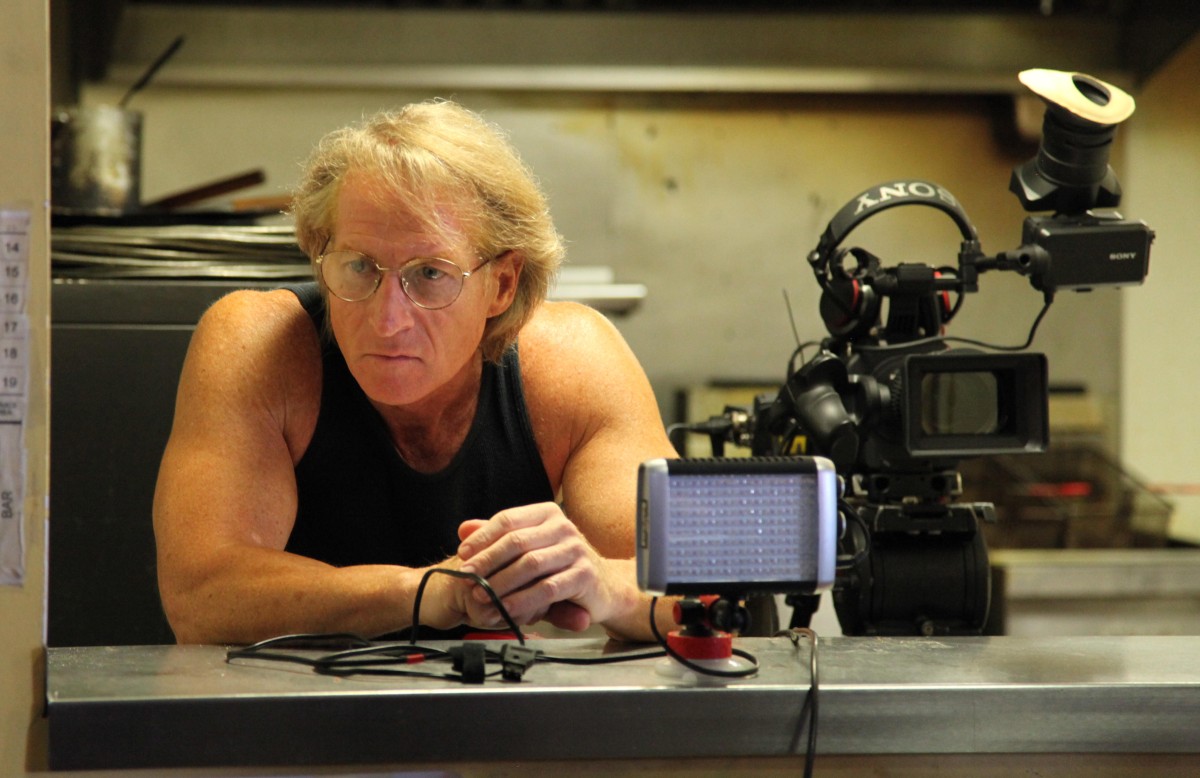
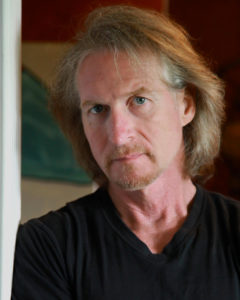
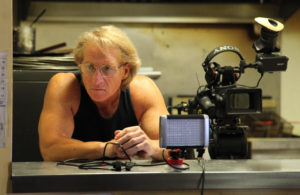
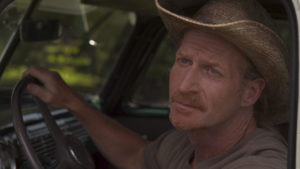
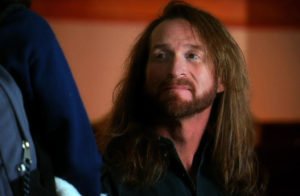
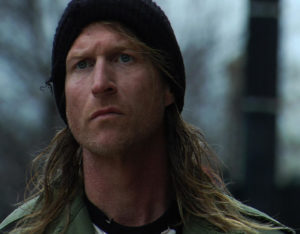
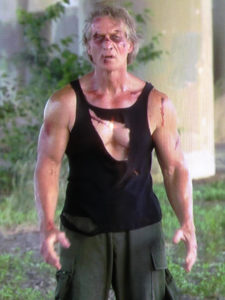
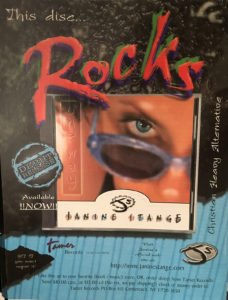
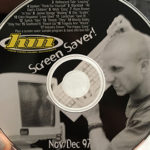
Comments